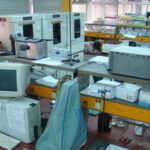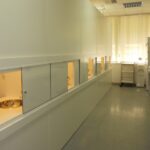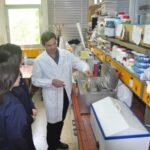Laboratory of Food Chemistry and Technology
Director
Laboratory Personnel
The Laboratory of Food Chemistry and Technology belongs to the Department of Process Analysis and Plant Design of the School of Chemical Engineering at NTUA. It is staffed by 2 faculty members and 3 laboratory teaching staff members. The Laboratory is equipped with chemical laboratory facilities with a total area of 250 m2 and a sensory evaluation laboratory with a total area of 50 m2.
Research Activity
The Laboratory of Food Chemistry and Technology conducts research on food processing and preservation processes, technology of major food products, food quality, food quality control/assurance, sensory evaluation of foods, kinetics of food deterioration and shelf-life assessment, as well as utilization of by-products from agricultural industries. In all processes concerning the studied foods, a central part of the Laboratory’s research is food quality, food safety, and quality control during processing; methods of measuring/assessing food quality for non-visible characteristics such as nutritional value, hygiene status, shelf-life, adulteration, etc.; and for visible (sensory) characteristics such as color, aroma, taste, odor, texture, etc.
In particular, the research activities of the Laboratory concern the following fields:
- Food processing and preservation processes: refrigeration, freezing, dehydration (traditional and spray drying)
- Food technologies: fats and oils (especially olive oil), milk and dairy products (yogurt, ice cream), cereals and bakery products (parbaked, frozen doughs), fruits/vegetables and fruit juices, meat products, fishery products, etc.
- Technology of protein concentrates
- Natural antioxidants
- Applications of alternative food ingredients: dietary fibers, alternative sweeteners, fat replacers, protein concentrates
- Predictive microbiology and food spoilage kinetics
- Functional foods (foods enriched with vitamins, trace elements, dietary fibers, probiotics, etc.)
- New technologies: TTIs, high hydrostatic pressure, pulsed electric fields, osmotic treatment, use of coating films
- Modified atmosphere packaging (MAP) of plant and animal products, intelligent packaging
- Utilization of agricultural industry by-products (whey, residues of oilseeds, residues from fruit juice production, etc.)
- Food quality and safety (HACCP)
- Sensory evaluation of foods
Educational Activity
The undergraduate courses offered by the Laboratory of Food Chemistry and Technology are structured over 4 academic semesters (6th, 8th, 9th, and 10th). All students are required to attend the general course “Food Science and Technology” in the 6th semester, while students who choose the specialization “Food Science and Engineering” may also attend the following specialized courses: “Food Chemistry, Microbiology and Principles of Food Preservation” in the 8th semester, “Food Engineering” in the 9th semester, and “Food Plant Design – Food Quality and Safety Assurance” in the 10th semester.
The “Food – Biotechnology” specialization, which includes this track, is chosen in the final years by approximately 35–40% of all students. The subjects taught include: Food Chemistry, Food Science and Engineering, Food Technology, Food Plant Design, Food Processing and Preservation, Food Packaging, Food Quality, Hygiene and Safety, and Sensory Evaluation of foods.
The courses offered by the Laboratory place special emphasis on food quality and quality factors, on methods of assessing/measuring them (instrumental analyses, physical, physicochemical, chemical, and sensory measurements), on quality control and assurance of foods, and on food quality and safety systems. Students are also trained in laboratory analyses, measurements, tests, and in statistical methods for processing results.
Furthermore, the Laboratory of Food Chemistry and Technology provides seminar-based training to graduates and professionals in the food sector. It organizes seminars addressed to executives of the food industry and consulting companies, offering modules on Food Quality – Quality Control/Assurance in the food industry, Food Hygiene and Safety (HACCP), Sensory Evaluation of Foods, Laboratory Accreditation, and Statistical Process Control (SPC).



